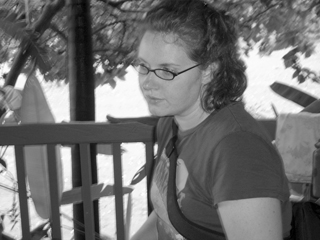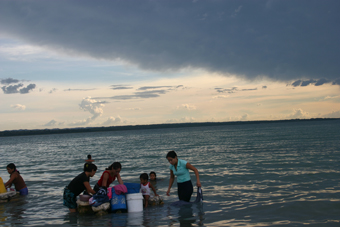Jessica Walter, jwalter@mosaicmennonites.org
“What good is anger?” I wondered as I participated in the Damascus Road Anti-Racism Process. I often avoid situations that I know will provoke my anger and agitation. For example, I haven’t watched the movie “Crash” yet because I know it will leave me feeling angry and helpless toward the injustices our society perpetuates. This combination of emotions only leads me to one thing…retreat from the world around me so that I can find a way to recover. But there’s got to be something positive I can do with this emotion of anger, right?
I’m angry for good reason…I’m angry at the injustices of racism, a social construct that was created and/or promoted whether intentionally or not by my ancestors. I’m angry that this social construct has stripped away the valuable cultural resources of my Irish and German heritage only to leave a white American identity that is wrapped up in oppressive conformity devaluing those who are not “white.” I’m angry that I have unknowingly participated in the systemic racism of our society. I’m angry that people I care about are constantly oppressed and that it feels as if there is nothing I can do to truly relieve that oppression.
I have often felt disempowered–as an introvert I felt like the underdog at times out-shined by peers whose extroversion was valued over my quiet steadfastness. But going through this anti-racism process helped me become more aware of just how much power I do have…I am in a position that asks me to tell the stories of 43 churches and 24 ministries, to help shape the types of leadership training provided for the leaders of these churches and ministries and to build relationships with and provide resources for young leaders across the country. I realize that I have more opportunity to influence than I ever imagined I could as a teenager. Though I have struggles to be heard as a young woman leader in the Mennonite Church I have to acknowledge that my voice is more likely to be heard in the broader society than that of my Black, Latina or Asian counterpart.
The weekend after I participated in Damascus Road I headed to Seattle, Wa. to attend “The New Conspirators: What in the world is God doing?”, a gathering of practitioners from four new streams of “renewal” in the church: Emerging, Missional, New Monastic and Mosaic. All but Mosaic are largely expressions of renewal in Euro-centric North American, United Kingdom, Australian and New Zealand realities. That is not to downplay the leaps and bounds each of these streams contributes toward bringing the Kingdom that Jesus spoke about into our current earthly reality.
The Mosaic stream however is a largely urban movement of new churches with a missional bent started by young leaders looking for a more multi-cultural church. These churches are young, diverse and often influenced by hip-hop culture in worship expressions.
On Saturday morning of the conference, Pastor Efrem Smith, co-author of “The Hip Hop Church” and Senior Pastor of Sanctuary Covenant Church in Minneapolis, Mn., shared with us how Martin Luther King Jr.’s vision of the “Beloved Community” requires a “Beloved Church.” Pastor Smith stuck it to his mostly white audience speaking on the issues of systemic racism I had just reflected on the weekend before. I sat amazed at how God was bringing my experiences together full circle.
“We have got to embrace and live in to our identity as God’s Beloved!!” he proclaimed. “Forget about trying to get your ‘white card’! Women, forget about trying to get your ‘man card’! We have lost so much of our selves and our cultures trying to all be alike when our only true identity is that of God’s Beloved!”
It was all I could do to hold back the tears coming to my eyes as Pastor Smith’s words spoke into my life. Suddenly I realized my response to “what good is anger?”
Anger is good when it makes you aware of things you hadn’t seen or could easily ignore before and motivates toward positive action. Moved by that sense of anger and loss, I will seek to embrace and re-discover my cultural heritage from the men and women who traveled from Ireland and Germany to escape religious persecution. With my anger, I will acknowledge that I do have power and influence and seek to promote and create possibilities for the variety of under-privileged and under-heard voices around me. More importantly with my anger I will remember that my identity lies in being God’s Beloved and will empower others to acknowledge their own identity as God’s Beloved.

 In the middle of July, I packed my bags and headed south to be an Orientation Leader for Eastern Mennonite Seminary’s LEAP program. LEAP, which stands for Learning, Exploring, and Participating, is a three week theological and cross-cultural exploration experience for high school students who have been recognized in their churches as rising leaders. The program guides students from urban, rural, and suburban backgrounds through a week of theological reflection focusing on where God is calling them and then sends them off to experience and witness how God is moving in another culture. This year the LEAP trips included Trinidad and Tobago, Mexico City, and Guatemala (my trip). As an Orientation Leader my job was to act as a chaperone, Resident Assistant, shepherd, guide, moral booster, encourager, friend, and Big Sister.
In the middle of July, I packed my bags and headed south to be an Orientation Leader for Eastern Mennonite Seminary’s LEAP program. LEAP, which stands for Learning, Exploring, and Participating, is a three week theological and cross-cultural exploration experience for high school students who have been recognized in their churches as rising leaders. The program guides students from urban, rural, and suburban backgrounds through a week of theological reflection focusing on where God is calling them and then sends them off to experience and witness how God is moving in another culture. This year the LEAP trips included Trinidad and Tobago, Mexico City, and Guatemala (my trip). As an Orientation Leader my job was to act as a chaperone, Resident Assistant, shepherd, guide, moral booster, encourager, friend, and Big Sister. I began to ask some of the same questions that the students on our trip were wrestling with too. One evening in the middle of our trip I sat down on the shore of Lake Petén Itzá with Gilberto and talked with him about the poverty in his native country as we watched women and men wash clothing and themselves in the lake as well as fill barrels for drinking water. As our conversation ended Gilberto went back to reading his newspaper and I sat silently reflecting that I had suddenly changed. I now had a new question that lingers with me: How can I go back to life as normal when I know more about the pain of this world and have allowed this experience to change me?
I began to ask some of the same questions that the students on our trip were wrestling with too. One evening in the middle of our trip I sat down on the shore of Lake Petén Itzá with Gilberto and talked with him about the poverty in his native country as we watched women and men wash clothing and themselves in the lake as well as fill barrels for drinking water. As our conversation ended Gilberto went back to reading his newspaper and I sat silently reflecting that I had suddenly changed. I now had a new question that lingers with me: How can I go back to life as normal when I know more about the pain of this world and have allowed this experience to change me?

 I recently participated in a conference at
I recently participated in a conference at